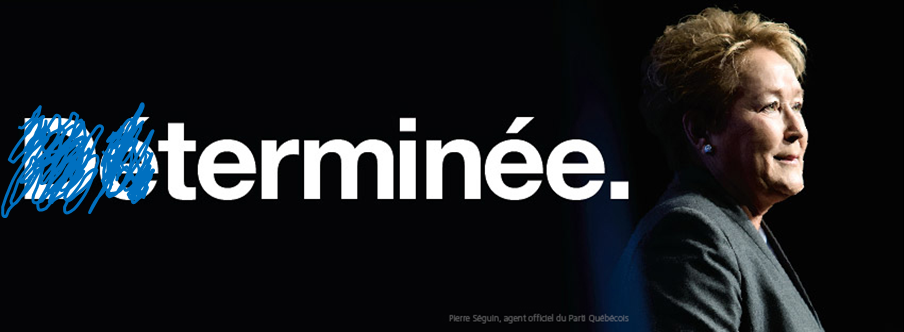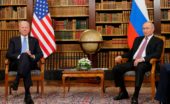Re Ian Bremmer 'Could third-party candidates upend the 2024 US election?' 3 April The current political movement in the USA…
Wednesday Night #1675
Written by Diana Thebaud Nicholson // April 8, 2014 // Wednesday Nights // Comments Off on Wednesday Night #1675
Monday night was a VERY GOOD NIGHT for federalists and all those who believe in the gros bon sens of the Québécois voter when push comes to shove (would that be ‘le shove’ ?).
Now that the euphoria of Election Night in Quebec is diminishing amidst all the self-congratulatory ramblings of the pundits and repeated pronouncements that the PLQ did not win the election, but rather that the PQ lost it (largely true), we can turn away from our (justifiable) obsession with Mme Marois and her team’s hateful, divisive policies and again focus on other events in the world, including the outcomes of elections far more fraught than Quebec’s. But before we do, we should share the great conspiracy theory floated at the Election Night gathering we were part of: PKP was a stalking horse, pushed by his good friend and chairman of Quebecor (federalist) Brian Mulroney to move the conversation to the separation issue in order to undermine the PQ campaign.
The Guardian points to April 2014: six elections, one billion people, the world’s most democratic month
In terms of sheer numbers, April will be the most democratic month the world has ever seen as national elections take place in half a dozen countries with total electorates of more than one billion people – in India, Afghanistan, Hungary, Indonesia, Algeria and Iraq – no mention of Quebec.
We won’t know the outcome of the Afghanistan election for some six weeks, however it is reported that the there was less Taliban-initiated violence than originally feared. But, the last days before the vote were marred for many by the killing of renowned AP photographer Anja Niedringhaus and wounding of Canadian reporter Kathy Gannon.
The results of Sunday’s poll in Hungary were an unhappy foregone conclusion, as illustrated by The Economist’s quote from Gordon Bajnai, a former technocrat prime minister of a Socialist-Liberal coalition “The election will be free in the sense that you can vote in a secret ballot, but not fair …Orban is trying to build a post-Soviet country on the model of Central Asia, Ukraine or Belarus. Hungary is en route to becoming an increasingly managed democracy.” The results have stirred up considerable concern, e.g. Hungary is becoming the biggest reason why we may have to leave the EU . Tony Deutsch has been following developments closely and comments that The Telegraph story is almost right ,but the journalism is sloppy. Who stole how much I do not know, but the competition between the previous governors and the incumbents is intense. Certainly, FIDESZ is poor at covering up the sudden affluence of its leaders. [Sunday’s] OSCE statement on [the] elections is devastating.
India launched the six-week Mega General Election campaign on Monday – it’s a nine-phase vote that will conclude on 12 May. Votes will be counted on 16 May. More than 814 million Indians are eligible to vote in a poll dominated by corruption and high inflation. We are hoping Cleo Paskal will keep an eye on developments for us.
Indonesia‘s parliamentary vote is Wednesday — Indonesia is the world’s third largest democracy, south-east Asia’s largest economy, a G20 member, and home to the world’s largest Muslim population. The statistics are staggering. In total, 235,637 legislative candidates are competing for nearly 19,699 positions across the country of more than 17,500 islands. It will take up to a month before official results are released. However, there are 56 registered organizations that will perform “quick counts,” which are similar to exit polls. Those results will be released two hours after the polls close. The Wall Street Journal offers good background on the vote.
Algeria goes to the polls on April 17th. President Abdelaziz Bouteflika is seeking a fourth term, campaigning on the need for economic reform – not everyone is happy and some opposition parties are boycotting the vote. The dominant issues (aside from the president’s health) are socioeconomic. Although Algeria managed to avoid the Arab Spring upheavals, thanks to $200 billion in reserves built up from oil and gas exports, state spending on social programs, credits and housing that helped ease any unrest, the country is mired in corruption, reform is slow and political and economic stagnation prevail.
Iraq‘s vote is on April 30 and promises to be the most troubling of all. As the Guardian notes: the “biggest anxiety is full-scale insurgency, spilling over from Syria, makes security parlous across much of the west of the country” The country that cost so many lives appears to be backsliding towards autocracy and instability, rendering democracy almost irrelevant. One early indicator of troubles ahead: Iraq electoral commission resigns en masse weeks before vote – and as the campaign begins, (the presumably new) electoral commission said on Tuesday that there will be no balloting in parts of the Sunni-dominated Anbar province engulfed in clashes between security forces and al-Qaida-inspired militants.
We can also return to stories we may have neglected over the past few days. Russia/Ukraine continues to escalate on Tuesday as Nato warns Russia against further intervention, but what, actually, can/will NATO do?
Writing in The Tyee, Andrew Nikiforuk, reminds us that the Ukraine Crisis Highlights Ugly Global Energy Truths
Half of Ukraine’s gas comes from Russia, and at one time the heavily industrialized Ukraine was Gazprom’s biggest and most prized customer…. Over the last decade, Ukrainian and Russian politics have been dominated by gas wars. Whenever Ukraine has leaned too far to the West, Russia has pulled the nation back with an assortment of energy carrots and sticks. When Russia threatened to turn off the gas in 2006, Ukraine threatened to shut down the gas transit system.
The search for pings emanating from the elusive black box of MH370 continues, but with less and less hope as the 30-day life of the batteries expires.
The IMF released its World Economic Outlook on Tuesday, noting that global recovery is becoming broader, but the changing external environment poses new challenges to emerging market and developing economies. The strengthening of the recovery from the Great Recession in the advanced economies is a welcome development, according to IMF staff. But the latest WEO also emphasizes that growth remains subpar and uneven across the globe.
“The recovery which was starting to take hold in October is becoming not only stronger, but also broader,” said IMF Chief Economist Olivier Blanchard. “Although we are far short of a full recovery, the normalization of monetary policy—both conventional and unconventional—is now on the agenda.”
Blanchard cautioned, however, that while acute risks have decreased, risks have not disappeared.
IMF words for Canada include a warning to the federal government [to] be ready to counter any further weakening of economic growth, which easily could occur
Faster growth in the United States should be good for Canada, as the U.S. is Canada’s largest export market. Yet the U.S. recovery is only good, not great. Exports will be stronger, but perhaps not as strong as they could be were Canada’s economy more competitive, the fund says. Growth in Canada still is too reliant on consumer spending and housing, both of which will be restrained by rising household debt levels.
“Although external demand could surprise to the upside, downside risks to the outlook still dominate,” the IMF says of Canada. “Fiscal policy needs to strike the right balance between supporting growth and rebuilding fiscal buffers, especially at the federal government level, with less room to maneuver at the provincial level.” We’ll be interested to see how Stephen Harper and Joe Oliver react.
Meanwhile Ottawa is embroiled in the Fair Elections Act controversy in which practically everybody has a bone to pick with the proposed legislation. One of the most recent public interventions comes from Duff Conacher: The ‘Fair Elections Act’ is wrong, but not for the reasons you may think
He makes some excellent points.
Wednesday Night media stars:
Kimon Valaskakis whose excellent Gazette op-ed Sovereignty is overblown: It would bring less power, not more was published last Saturday
Adam Daifallah‘s mercifully succinct and pertinent Hatley Minutes enlightened and were helpful for far-away friends; the most recent appeared on Tuesday morning and we hope that the end of the election campaign does not signal the end of these features.
The indefatigable Beryl Wajsman appeared more times than we can count on a variety of television and radio shows; perhaps his finest contribution was This is the referendum – his exhortation to all to vote
Brett House: The IMF is turning 70. Here’s why you should celebrate
(Quartz) As it nears the 70th anniversary of its conception at the Bretton Woods Conference in 1944, the International Monetary Fund (IMF)—whose biannual meeting starts today—is arguably the public institution most essential to the future of the global economy. Yet plenty of people are still convinced it is either evil or useless.
Perhaps more than any other body, the IMF has acted on the dictum that you should never let a good crisis go to waste; and since the failure of Lehman Brothers in 2008 and the onset of the Great Recession, the IMF has had a very good crisis indeed.
Brett will be speaking at a CIC event next Wednesday – the 16th – on “Getting Ready for the Next Global Public Debt Crisis” Register early as the capacity is 55




